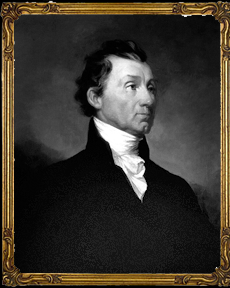
James Monroe
Term Date: 1817-1825
Political Party: Democratic-Republican
Vice President: Daniel D. Tompkins
Born Place: Westmoreland County, Virginia
Born Date: April 28, 1758
Died Place: New York, New York
Died Date: July 4, 1831
First Lady: Elizabeth Kortright
Children: 3
Parents: Spence Monroe, Elizabeth Jones
Other Political Offices:
Continental Congress, 1783-1786
United States Senator (Virginia), 1790-1794
Minister to France, 1794-1796
Governor of Virginia, 1799-1802
Minister to France and England, 1803-07
Secretary of State, 1811-1817 (under James Madison)
Secretary of War, 1814-1815 (under James Madison)
Occupation before elected:
Lawyer
Brief History:
He fought with distinction in the Continental Army, and practiced law in Fredericksburg, Virginia. Monroe enlisted in the 3rd Virginia Regiment in the spring of 1776. As a lieutenant he saw action in the battles in New York.He was also involved the Northwest Ordinance of 1787. Monroe's 2nd term was not a favored caused by the Missouri debates and by others wanting to succeed him as president. Monroe began his presidency by reviving the presidential tour, emulating George Washington. The trip took him fifteen weeks, and resulted in his having been seen personally by more Americans than any previous president. On foreign policy, Monroe sent Andrew Jackson to the Spanish Florida border to protect settlers from Seminole Indians. Jackson led his troops deep into the areas of Florida Spanish rule. Under his presidency he agreed to purchase Florida from Spain in 1819.
Another crisis came in 1819, when the admission of Missouri to the Union as a slave state threatened to hinder the legislative balance between North and South. He issued the Monroe Doctrine in 1823, a policy concerned with both Latin America and the Northwest Territories. After his retirement, he lived on an estate in Loudoun county, Virginia and Like Jefferson, he had been left so deeply in debt by his long years of public service that it seemed he might lose all of his property. His last public service was as a presiding officer of the Virginia constitutional convention. Early in his administration, Monroe undertook a goodwill tour. At Boston, his visit was hailed as the beginning of an "Era of Good Feelings." Unfortunately these "good feelings" did not endure, although Monroe, his popularity undiminished, followed nationalist policies.
Another crisis came in 1819, when the admission of Missouri to the Union as a slave state threatened to hinder the legislative balance between North and South. He issued the Monroe Doctrine in 1823, a policy concerned with both Latin America and the Northwest Territories. After his retirement, he lived on an estate in Loudoun county, Virginia and Like Jefferson, he had been left so deeply in debt by his long years of public service that it seemed he might lose all of his property. His last public service was as a presiding officer of the Virginia constitutional convention. Early in his administration, Monroe undertook a goodwill tour. At Boston, his visit was hailed as the beginning of an "Era of Good Feelings." Unfortunately these "good feelings" did not endure, although Monroe, his popularity undiminished, followed nationalist policies.

